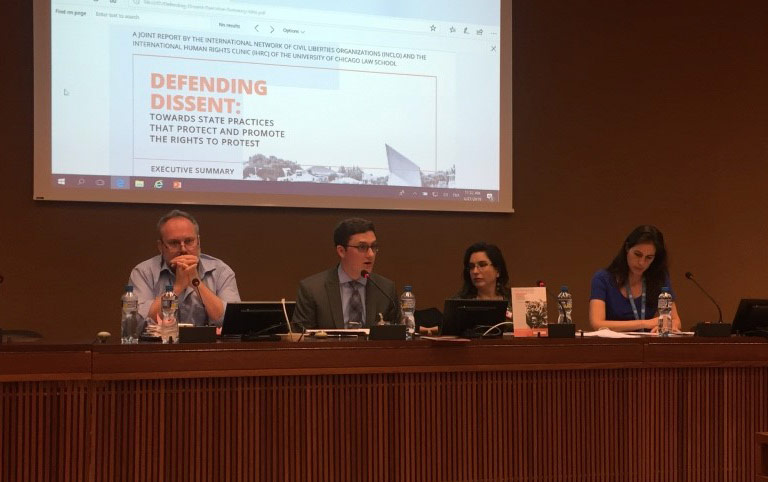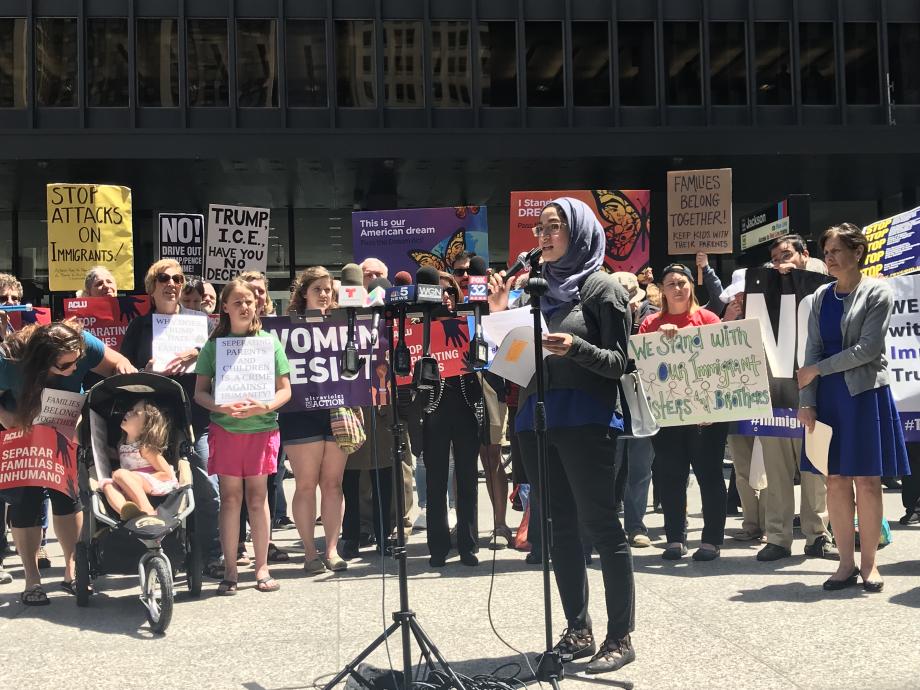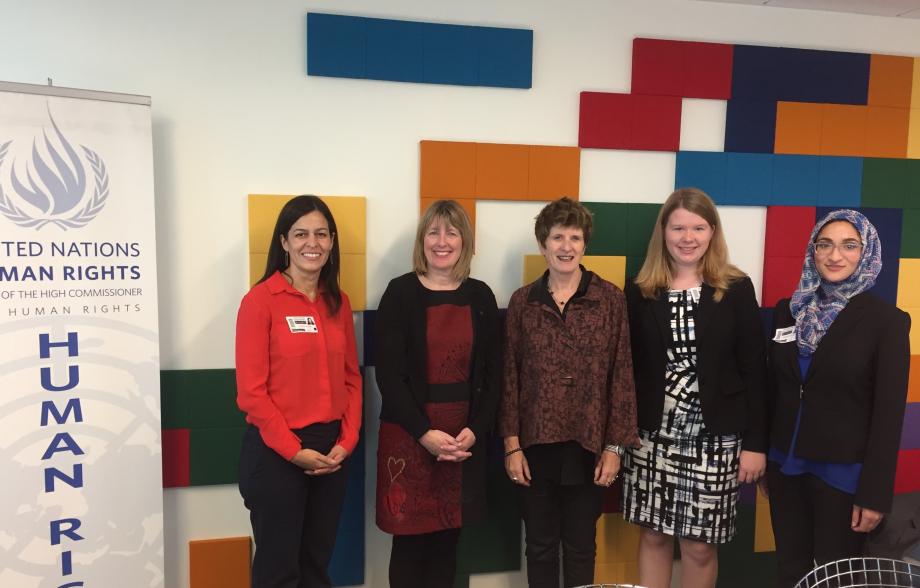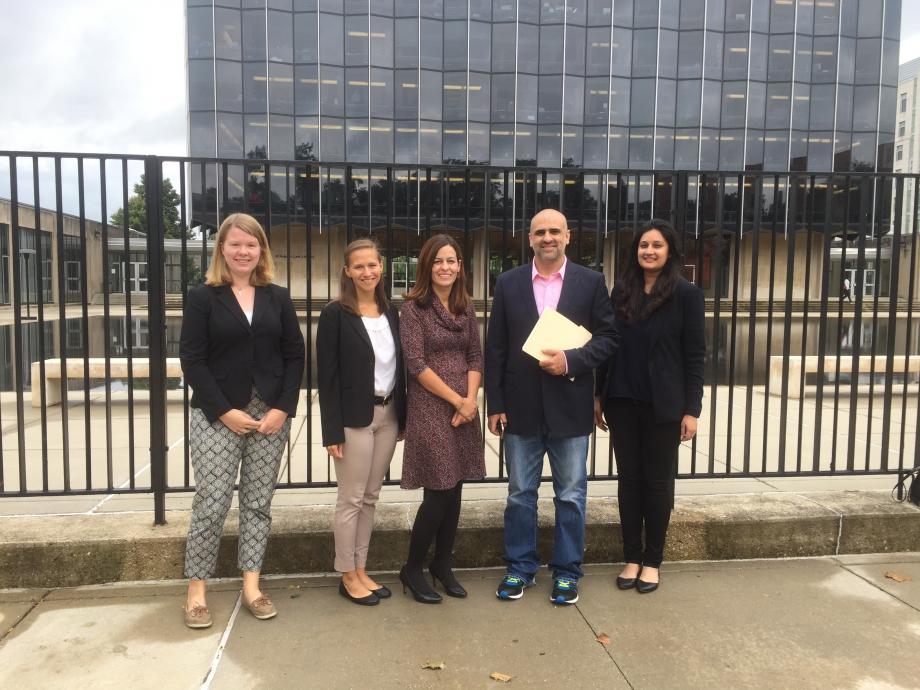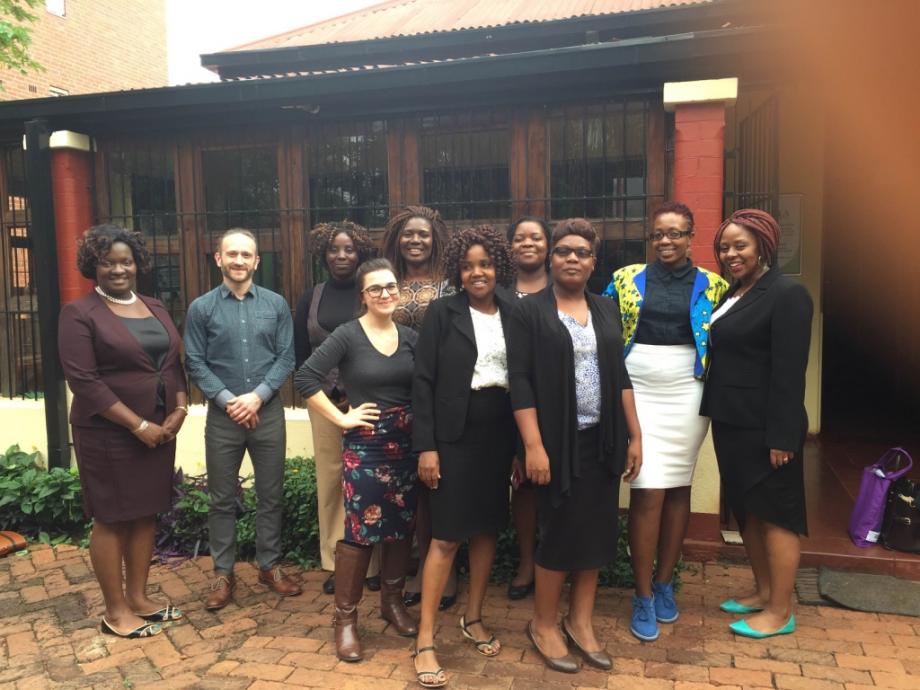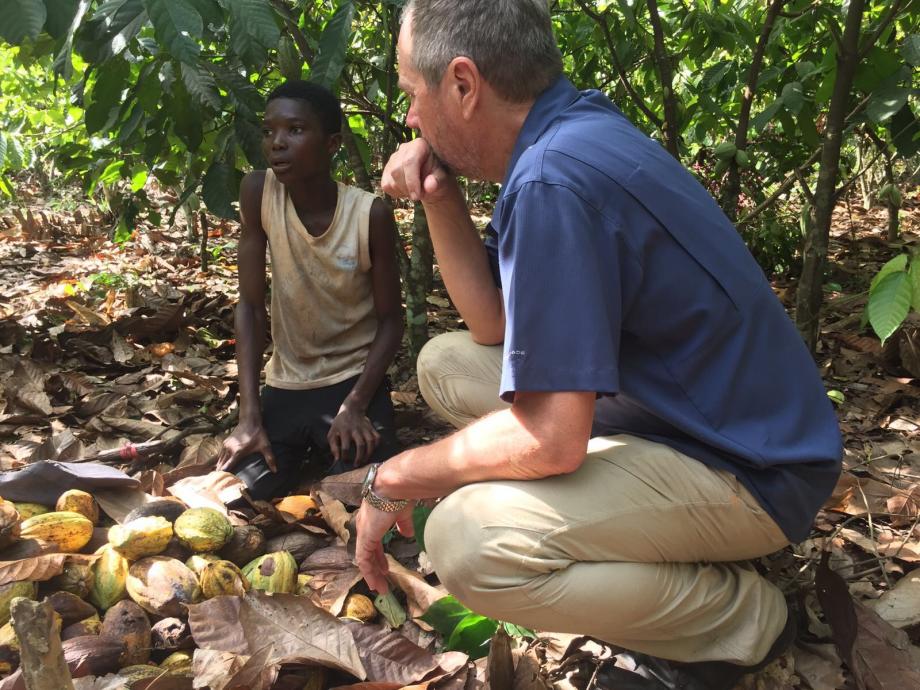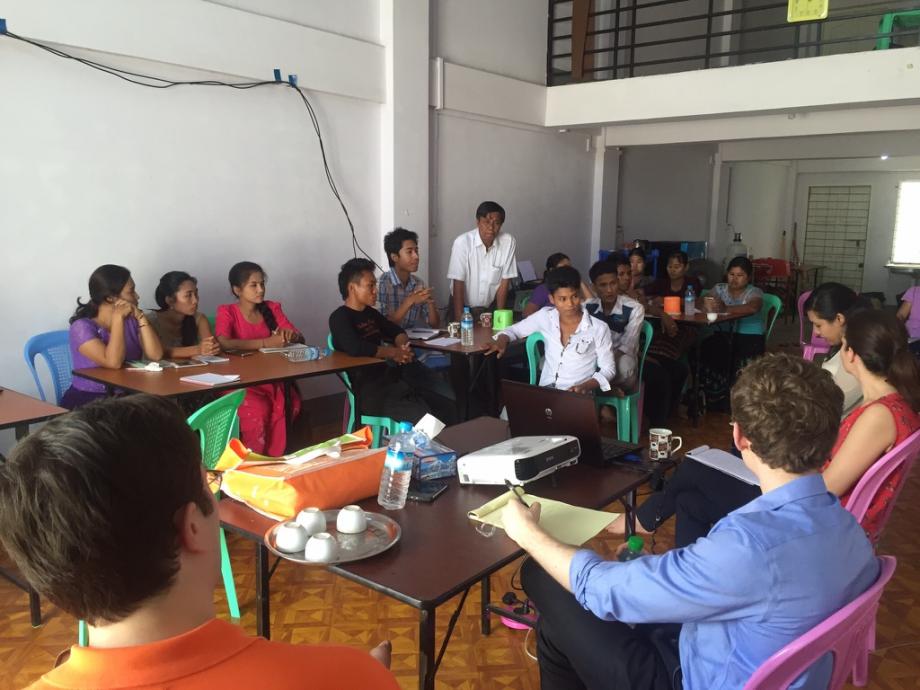Global Human Rights Clinic Work
Criminal Justice
Solitary Confinement in the U.S. and International Standards
Issue
An estimated sixty to one hundred thousand people in the United States are held in solitary confinement every year. Despite the documented harms caused by this form of isolation, the practice has become widespread in the United States and remains largely unregulated; prisoners are often held in solitary confinement for prolonged or indefinite periods of time. Peer nations have increasingly restricted and regulated solitary confinement as a result of substantial evidence of the harms it causes. The United States is alone among its peers in its continued diffuse and unchecked application of the practice, undermining its long-held commitment to the protection of human dignity more broadly. Today, evolving standards of decency, as reflected by research findings and global practice, mandate regulation and restriction of solitary confinement. Prolonged and indefinite confinement violates the Eighth and Fourteenth Amendments’ prohibition on cruel and unusual punishment as well as the fundamental dignity of those held in our prisons.
Clinic Work and Impact
In support of Roderick and Solange MacArthur Justice Center appellate litigation challenging solitary confinement conditions across the country, GHRC submitted an amicus brief on the extent to which United States law, policy and practice on solitary confinement are out of step with international standards and the policies and practices of peer nations. The brief emphasizes measures adopted by peer nations to mitigate the harms of isolation, including allowing access to the outdoors; regular visits and human contact; and access to programming while held in solitary confinement. It also reviews regulations of peer nations that limit the reasons why someone can be moved into solitary confinement, as well as regulations that limit the duration and renewal of terms of solitary confinement. The amicus brief was filed in a series of cases, including two petitions for writ of certiorari in the Supreme Court: James Bailey Synder v. United States, No. 19-742, and Charles Hamner v. Danny Burls, et al., No. 19-1291, as well as in federal and state courts, including: Hamner v. Burls, No. 18-2181 (8th Cir. 2019); DePaola v. Clarke, No. 16-7360 (4th Cir. 2018); United States v. Bailey-Snyder, No. 18-1601 (3rd Cir. 2019)(cert petition); Chavez v. Peters, 2019 WL 922237, appeal filed No. 19-3544 (9th Cir. 2019); and Johnson v. Pennsylvania Department of Corrections, No. 4:18-CV-09124 (M.D.Penn. 2019). Amici curiae include law professors, clinicians and scholars of human rights and nonprofit organizations that seek to enforce international and constitutional rights.
Related Blogs and Media Coverage
Pursuing Humane Prison Practices: Solitary Confinement Reform in the United States — Global Human Rights Clinic Blog
Military Commission’s Compliance with International Human Rights and Humanitarian Law at Guantanamo Bay
Issue
The 9/11 case currently before the military commissions at Guantánamo Bay Detention Camp raises serious concerns about judicial independence and impartiality, among other human rights abuses. In this case, five men, Khalid Shaikh Mohammed, Walid Muhammad Salik Mubarek Bin ‘Attash, Ali Abdul Aziz Ali (a.k.a Ammar al-Baluchi), Ramzi Bin al Shibh, and Mustafa Ahmed Adam al Hawsawi, are accused for their alleged roles in the September 11th attacks. The defendants are charged with conspiracy; attacking civilians; intentionally causing serious bodily injury; murder in violation of the law of war; hijacking or hazarding a vessel or aircraft; and terrorism. Numerous aspects of the administration of Guantánamo Bay, including the torture of detainees, lengthy detention of suspects without trial, lack of transparency about its operation, and trial of suspects before military tribunals, have been intensely criticized by human rights advocates, courts, and concerned civilians. As the trial date for the 9/11 case approaches, the structure and operation of the military commissions also raise serious concerns about its compliance with international standards, particularly its judicial independence and impartiality
Clinic Work and Impact
In 2018, the Global Human Rights Clinic began collaboration with the Ammar al-Baluchi Defense Team, one of the most active defense teams in the 9/11 case. The Baluchi Defense Team has raised a series of challenges to the jurisdiction, applicable laws, and processes of the military commissions on constitutional, statutory and international law grounds before the US Court of Military Commission Review (CMCR) and the DC Circuit Court of Appeals. The Global Human Rights Clinic assisted in this effort by analyzing and briefing the Baluchi Team on the Military Commission’s compliance with international human rights and humanitarian law.
The Clinic also became an observer organization to the Military Commissions, allowing a student or faculty representative to observe military commission proceedings at the Naval Station in Guantanamo Bay, Cuba (GTMO).
Related Blogs and Media Coverage
The Unreasonableness of the Citizenship Distinction: Section 412 of the USA PATRIOT Act and Lessons from Abroad, by Nino Guruli — University of Chicago Law Review Online
Civil and Political Rights
International Standards and Police Use of Force Policies in the U.S.
Issue
Society vests law enforcement with the responsibility to protect public safety and enforce the law when necessary. For these reasons, law enforcement officers are granted the immense power to use force, including lethal force. Police use of force implicates the basic rights of every individual subject to this power—the rights to life, security of person, freedom from discrimination and equal protection of the laws. The authority to use force—state sanctioned violence—necessarily comes with limits and obligations to ensure those who enforce the law do not abuse it.
To address the need to guide and limit the use of lethal force by police, the 193 member states of the United Nations, which include the United States, have developed principles and standards to constrain, direct and ensure the proper use of lethal force. These principles—legality, necessity, proportionality and accountability—have been advanced and concretized in various forms in the international system through the following primary sources: the U.N. Code of Conduct for Law Enforcement Officials; U.N. Basic Principles on the Use of Force and Firearms by Law Enforcement Officials; and the 2014 report of the former U.N. Special Rapporteur on extrajudicial, summary or arbitrary executions, Christof Heyns, on protection of the right to life during law enforcement.
Clinic Work and Impact
In 2015, Amnesty International, USA released “Deadly Force: Police Use of Lethal Force in the United States,” evaluating state laws’ compliance with international human rights standards. The report found that not a single state’s law fully complied. During October 2015 to August 2018, the Global Human Rights Clinic undertook research and drafted a report examining the other main source of accountability for the use of force: police department policies. To capture a large portion of the population and a diverse set of contexts, clinic students and faculty evaluated the police policies from the 20 largest U.S. cities by population during 2017 to 2018. These internal departmental policies provide the primary guidance to police officers on when and how they may use lethal force.
After “use of lethal force” policies of police departments in the 20 largest U.S. cities by population in 2018 were collected, clinic students and faculty developed a grading system to analyze the policies. The resulting report, Deadly Discretion: The Failure of Police Use of Force Policies to Meet Fundamental International Human Rights Law and Standards found that the 2018 police department use-of-force policies in the nation’s 20 largest cities failed to meet international human rights standards on police use of force. The report, which was published by the University of Chicago Law Review Online, was released in the midst of global protests sparked by the killings of George Floyd, Breonna Taylor, and Ahmaud Arbery, among others. Leading up to and following the UN Human Rights Council’s recent ‘urgent debate’ on systemic racism and police in the United States, the Clinic presented the Report to numerous UN mechanisms and bodies, including the members of the Human Rights Committee and the Human Rights Council. It was also shared with numerous experts and members of Congress. The Clinic also conducted analyses of various pieces of proposed legislation at the state and federal level, including the Justice in Policing Act of 2020, at the request of advocates and policy makers.
Read the report: Deadly Discretion: The Failure of Police Use of Force Policies to Meet Fundamental International Human Rights Law and Standards.
Related Blogs and Media Coverage
New IHRC Report: In Largest US Cities, Police Use-of-Force Policies Fail to Meet Human Rights Standards — University of Chicago Law School
The Deadliness of American Exceptionalism — Global Human Rights Clinic Blog
Study Finds Police in 20 of Top 20 US Cities Violate Human Rights — Nonprofit Quarterly
Experts Say American Police Fail International Human Rights Standards — WBEZ
Lethal force laws reexamined after police killings; is reasonableness standard too easy? — ABA Journal
‘State-sanctioned violence’: US police fail to meet basic human rights standards — The Guardian
Policing of Protests
Issue
Protests and other forms of public speech and assembly are a central tool of free expression and civic engagement, often serving as the only avenue for advocacy seeking political, social, and economic reform. Despite the importance of protest to a free society and safeguarding human rights, many states have failed to adequately protect protest and public speech. Instead, policing institutions overwhelmingly treat protests, assemblies, and other gatherings as security threats that should be discouraged and disbanded when possible.
Clinic Work and Impact
The International Network of Civil Liberties Organizations (INCLO) is a network of thirteen civil liberties organizations throughout the world. INCLO was formed to respond to civil liberties violations occurring in members’ jurisdictions through coordinated advocacy efforts. For the last three years, INCLO has made advocacy for a human rights approach to police engagement with protesters one of its priorities. Last year INCLO released a report on the health effects of crowd control weapons titled Lethal in Disguise: The Health Consequences of Crowd-Control Weapons.
As a follow-on to its Lethal in Disguise report, INCLO engaged IHRC to research and draft a practical guidance for policing institutions and collaborators for how such institutions can protect human rights and the right to public speech when engaging with public assemblies. The report, Defending Dissent: Towards State Practices that Protect and Promote the Rights to Protest, offers good practices and analysis of existing laws, institutional mechanisms and processes, and deployment tactics that work to promote, or in some cases, undermine, protests and public assemblies. In March of 2018, students and faculty supervisors traveled to London and Belfast to interview policing experts on good practices. The research team also conducted phone interviews of experts in other locations. INCLO partners used the IHRC questionnaire to interview experts in their own jurisdictions. The final report, drafted by IHRC and edited by INCLO members, reflects good and bad practices throughout the world on all aspects of police engagement with protests.
Defending Dissent was launched in June of 2018, at the Palace of Nations in Geneva, Switzerland, at a side event during the Human Rights Council’s 38th Session before UN officials, civil society from across the globe, and the U.N. Special Rapporteurs and their staff working on this issue. In addition to serving as a public education tool, the report will now be used by INCLO organization members to advocate within their countries on improvement of police policies and practices on protest management. Defending Dissent is also being used to support the adoption of a resolution on police management of protests introduced in the U.N. Human Rights Council by Costa Rica and Switzerland.
In July of 2020, the United Nations Human Rights Committee issued General Comment 37 on the right of peaceful assembly, which provides authoritative interpretation of Article 21 of the International Covenant on Civil and Political Rights. Defending Dissent: Towards State Practices that Protect and Promote the Rights to Protest follows several years of advocacy work by civil society organizations and provided foundational research for INCLO’s Written Contribution on the Preparation of a General Comment on Article 21, submitted to the United Nations Human Rights Committee in March of 2019 for consideration during the drafting stages of General Comment 37.
Read the report: Defending Dissent: Towards State Practices That Protect and Promote the Right to Protest
Related Blogs and Media Coverage
Defending Dissent: New Report by International Human Rights Clinic Offers Guidelines on How Governments Can Protect Rights of Protesters — University of Chicago Law School
What do we say to Big Brother? Not today — International Human Rights Clinic Blog
International report highlights use of videos in Jobstown trial — The Irish Times
Nigeria and Policing
Issue
Nigeria’s Police Act of 1943, written and enacted under British colonial rule, almost two decades prior to Nigerian independence in 1960, established the Nigeria Police force. The 1943 law was in place for more than 75 years without amendment before the National Assembly finally repealed and reformed the Police Act in 2019 with the passage of the Police Act (Repeal and Re-Enactment) Bill, 2018. Key objectives of the 2018 Repeal and Re-Enactment Bill were creating a policing structure that guarantees the protection of the rights and freedom of citizens; establishing a system that prevents and detects crimes, apprehends offenders and duly enforces all laws and regulations within its mandate; and ensures an effective collaboration and co-operation between the Police Service and communities. However, in terms of complying with international human rights law and standards, the legislation was insufficient and required revisions in several specific issue areas, including on use of force and firearms; policing of public gatherings; arrest and detention; prevention of torture and cruel, inhumane and degrading treatment; and ensuring equality and non-discrimination. Nigeria is bound by international and regional law, including the International Covenant on Civil and Political Rights and the African Charter on Human and Peoples’ Rights, to uphold in its legislation principles of accountability and transparency, and the protection of human rights and fundamental freedoms.
Clinic Work and Impact
In partnership with the International Human Rights Law and Practice Clinic at the Northwestern Pritzker School of Law, the Global Human Rights Clinic wrote and submitted a Memorandum to the Senate Committee on Police Affairs in December of 2018 to support the National Assembly and Senate Committee on Police Affairs in their efforts to reform the Nigeria Police Force with the Bill for an Act to Repeal the Police Act CAP P19 (LFN 2004) and enact the Police Act, 2018 (SB.682). The memorandum identified problematic provisions of the draft bill and proposed language to ensure the final statute advanced the protection of human rights in accordance with the Constitution of the Federal Republic of Nigeria and international human rights law. It presents the international law and standards that govern policing, to which Nigeria is bound under international and regional law to uphold.
Land Disputes and Restitution in Myanmar
Issue
Disputes over land use and ownership in Myanmar have caused regional instability, internal population displacement, conflict, and socio-economic distress. The conflicting claims to land can be attributed to changes in government administration, inconsistent legal property regimes, inadequate administrative recordkeeping, and unregulated government land seizures. Resolution of these disputes through a restitution mechanism and establishment of a cohesive land ownership and use regime is central to ultimately establishing rule of law and respect for human rights as well as to the long-term economic development of Myanmar.
Clinic Work and Impact
At Oxfam’s request, IHRC researched possible models for restitution mechanisms that would move Myanmar towards settlement of pending land disputes. The IHRC research team identified comparative best practices in countries with comparable post-colonial and post-conflict environments to Myanmar as well as the relevant United Nations norms and human rights instruments that set standards for a human rights approach to land use disputes.
The student team and IHRC director then traveled to Yangon to participate in a day-long workshop on land restitution in Myanmar with international and national civil society stakeholders. The student research team presented the findings and conducted further interviews of experts to determine the relevant factors of Myanmar’s restitution mechanism. The report has been used by stakeholders in the country to advocate for a restitution system that will assist the return of internally displaced persons, including Rohingya communities.
Read the report: Resolving Land Disputes through Restitution Dynamics: A Comparative Analysis of Country Case Studies
Immigrant’s Rights
Abuse of Immigrant Children in U.S. Custody
Issue
Many immigrant children cross the border alone, fleeing violence and seeking to reunite with their family members. These children are typically apprehended by CBP and Border Patrol officials at the southern border of the United States. After apprehension, they are processed and detained before being transferred or deported. Domestic and international law requires that throughout this process these children be treated with heightened care appropriate to their age and resulting vulnerability. These laws require that children be provided with safe and humane conditions responsive to their needs while in detention.
Despite these protections, records obtained by the ACLU Border Litigation Project of reports of abuse by detained children reveal widespread abuse and neglect of these children in U.S. custody over a multiple year period. Reports from children in custody indicate that, from apprehension through to transfer or deportation, child detainees were intimidated, mistreated, and in some cases assaulted by U.S. government officials.
Clinic Work and Impact
The American Civil Liberties Union’s Border Litigation Project (ALCU BLP) asked IHRC to review and analyze the subset of documents from Department of Homeland Security (DHS) concerning abuse and neglect of immigrant children in the custody of Customs and Border Protection (CBP). The records the ACLU obtained document a pattern of intimidation, harassment, a refusal of medical services, and physical and sexual abuse. They also reveal the government’s failure to effectively investigate these abuses and to hold those responsible accountable. Following review, the IHRC student and faculty team, in collaboration with the ACLU BLP, drafted a report, Neglect and Abuse of Unaccompanied Children by U.S. Customs and Border Protection, aimed at making the documents accessible and highlighting patterns of abuse and lack of effective response to reported abuse. The Report was launched in May of 2018.
The Clinic, in partnership with the ACLU, engaged in extensive public advocacy for reform based on the report findings. The IHRC report was covered by Newsweek, the Chicago Tribune, Al Jazeera, NPR Weekend Edition, and numerous other outlets. The report was a key tool for advocates seeking reform within our border patrol system. Some examples of use of the report include a citation by the U.S. House of Representatives Committee on Homeland Security in a letter requesting an investigation into the treatment of unaccompanied migrant children in the custody of Customs and Border Protection, and at a meeting of the Cook County Board of Commissioners, where a resolution was passed encouraging Congress and the Executive Branch to reform the current immigration policy.
Read the report: Neglect and Abuse of Unaccompanied Immigrant Children by U.S. Customs and Border Protection
Related Blogs and Media Coverage
Report: US Border Patrol Officials Have Abused Young Migrants — Chicago Tonight
Border Patrol Kicked, Punched Migrant Children, Threatened Some With Sexual Abuse, ACLU Alleges — Newsweek
Abuse of immigrant children alleged in documents examined by Chicago law students — Chicago Tribune
American fascism is attacking migrant children — Al Jazeera
ACLU Report: Detained Immigrant Children Subjected To Widespread Abuse By Officials — NPR Weekend Edition
Women’s Rights
Human Rights and Global Surrogacy
Issue
The growth of the global gestational surrogacy industry in the last few decades has raised concerns about the human rights of the parties involved. Partly due to these concerns, several of the countries where surrogacy was once widespread have recently prohibited the practice. The practice implicates several important human rights including, women’s reproductive rights, the rights of children and those of intended parent(s). Some of these rights may be threatened by the practice, but some are also promoted. The legal framework, institutional capacity to enforce the law, availability and quality of health care, societal and economic considerations, as well as historical violations all impact how surrogacy impacts the human rights of the parties involved.
Clinic Work and Impact
Research conducted during the 2018-2019 academic year by the Global Human Rights Clinic was submitted in a report to the United Nations Office of the High Commissioner for Human Rights (OHCHR) and contributed to OHCHR’s ongoing work on human rights and global surrogacy. In June of 2019, GHRC presented the report findings to the United Nations' Committee on the Elimination of all Forms of Discrimination Against Women (CEDAW) in Geneva, Switzerland.
In March of 2019, students and faculty visited Cambodia, with assistance from OHCHR in Cambodia, to conduct in-country fact-finding. GHRC students and faculty interviewed various stakeholders including three surrogates, high-level public officials at the Cambodian Ministry of Justice, Ministry of Women’s Affairs and the National Committee for Counter Trafficking, investigative judges, a scholar, and representatives of non-governmental organizations in the fields of counter-trafficking and public health. The resulting report was presented to the OHCHR, representatives from the World Health Organization (WHO), as well as members of the Convention on the Elimination of All Forms of Discrimination against Women (CEDAW) Committee in Geneva in June 2019. In November 2019, the CEDAW Committee issued its Concluding Observations to the 6th periodic report of Cambodia and made recommendations that Cambodia decriminalize surrogacy and adopt a rights-based approach, consistent with the clinic’s recommendations.
This research, along with the foundational desk research, has been consolidated in a report Human Rights Implications of Global Surrogacy.
Related Blogs and Media Coverage
Kelly Geddes, ’20, Presents the International Human Rights Clinic’s Surrogacy Report to UN Committee — University of Chicago Law School
Women and the Prevention of Violent Extremism
Issue
The global community has endeavored to prevent and combat violent extremism. States and civil society partners have increasingly recognized women’s role in this effort as critical to its success. The effective engagement of women, who represent half of the world’s population, is necessary to a successful strategy. However, gender-sensitive and gender-effective approaches to preventing and countering violent extremism (PCVE) have remained elusive. Women’s involvement in PCVE strategies continues to be largely marginal, often reinforcing harmful stereotypes and sometimes resulting in negative consequences for gender equality. The failure to effectively address the discriminatory impact of PCVE strategies on women not only hampers the efficacy of PCVE efforts but also impedes state party implementation of the Convention on the Elimination of All Forms of Discrimination against Women (CEDAW), which requires elimination of discriminatory laws, policies, and programming.
Clinic Work and Impact
The Clinic conducted fact-finding missions to Tunisia and Kenya aimed at exploring the impact of prevention efforts against violent extremism on women’s human rights and equality. This research was conducted on behalf of the U.N. Office of High Commissioner for Human Rights to assist the OHCHR in developing its programs, policies, and strategies on violent extremism in a way that protects and promotes women’s equality. The Clinic interviewed intergovernmental agencies, international and domestic NGO’s, academics, and policy advisors on current and future programming around prevention of violent extremism and the extent to which such programming involved women as targets and/or leaders. The Clinic submitted its findings and recommendations to OHCHR, which were then used for their 2017 strategic planning. In October of 2017, a student member of the research team and clinic director also presented report findings at the United Nations headquarters in an inter-agency meeting of the UN Office of the High Commissioner of Human Rights. Kate Gilmore, the Deputy High Commissioner for Human Rights, and Fionnuala Ni Aolain, the Special Rapporteur on the protection of human rights and fundamental freedoms while countering terrorism, were also in attendance.
Violence against Women in Pakistan
Issue
The 2014 Global Gender Gap Report ranks Pakistan as 141 out of 142 countries in terms of women’s inequality. Seventy to ninety percent of women in Pakistan report having experienced violence. In Punjab alone, each day, an estimated six women are murdered or are the victims of an attempted murder; eight women are raped; eleven women are assaulted or are the victims of battery; and thirty-two women are abducted. In February of 2016, the Punjab Protection of Women Against Violence Act (PWAVA) was passed to prevent and address violence against women in Punjab. The PWAVA established the Violence Against Women Center (VAWC), in an effort to address violence against women and provide comprehensive services for survivors of violence.
Clinic Work and Impact
In a project for the government of Punjab, Pakistan, the Clinic developed and drafted the Standard Operating Procedures (SOP) and implementing regulations for the Violence Against Women Center (VAWC) created by the Punjab Protection of Women Against Violence Act of 2016. The Standard Operating Procedures developed by the Clinic will be used by all departments and individual staff in the VAWC including prosecutors, civil legal officers, psychologists and counselors, intake staff, medical staff and examiners, and management. The Clinic engaged faculty from the University of Chicago medical school and faculty and staff from the School of Social Service Administration to assist in development of the SOPs. The Clinic also developed implementing regulations for the Center currently being finalized by the Punjab government.
Related Blogs and Media Coverage
Foreign institution to help set up anti-violence centres — Dawn
Violence Against Women: Salman Sufi honoured for his work — The Express Tribune
International Human Rights Clinic to Provide Technical Assistance in Implementation of Law Protecting Women in Pakistani Region — University of Chicago Law School
Protecting Unsympathetic Defendants, From The United States To Pakistan — HuffPost
Girls' Education in Zimbabwe
Issue
Zimbabwe enacted a new constitution in July of 2013. As a direct result of extensive advocacy by women’s rights organizations, the new constitution contains robust and comprehensive protections of women’s human rights and principles promoting gender equality. There is need for further development of new strategies to encourage women’s and girls' empowerment in Zimbabwe, in the hopes of bringing the promises of the 2013 Constitution in full relief for women and girls.
Clinic Work and Impact
IHRC worked with a variety of stakeholders, including the Zimbabwe Women’s Lawyers Association (ZWLA), to promote the implementation of women’s rights in the Constitution of Zimbabwe. With guidance from ZWLA, students first conducted desk research on a number of key issues, including women’s property ownership and marriage laws, to examine whether existing laws and policies are in compliance with the rights to property and marriage enshrined in the new constitution. The Clinic produced a report that documents this research and served as the foundation for a research trip to Harare, Zimbabwe in March 2016. During the trip, Clinic members met with diverse stakeholders, including a leading member of Parliament, a judge, and domestic and international NGOs, to present the Clinic’s research and determine where action could be taken to implement women’s rights to property and marriage. Following the trip, and based on the feedback obtained from key stakeholders, IHRC students produced a report detailing the research and plan of action to develop and implement a national “Take a Girl Child to Work Day” in Zimbabwe. The report was shared with the group of stakeholders in order to provide a road map to implementing the project, with the ultimate aim of promoting the rights of girls and women in Zimbabwe and distinctly discouraging child marriage.
Workplace Rights
Domestic Workers Employed by Foreign Diplomats
Issue
Domestic workers employed by foreign diplomats and international officers in the United States face serious risk of human rights violations due to the diplomatic immunity enjoyed by their employers. The design and implementation of visa programs for domestic workers of diplomats has enabled the exploitation of domestic workers trafficked into the country by diplomats and other foreign representatives working for international organizations. Lured by promises of fair pay and good working conditions in the homes of ostensibly reputable and high-powered individuals, these migrant workers arrive only to find themselves trapped in conditions of domestic servitude. Survivors’ accounts of their living and work conditions reflect patterns of abuses: employers who confiscate passport and identification documents, isolate them from the outside world, subject them to degrading work and home environments, including back-breaking labor for long hours, low or withheld wages, or compensation at illegal and substandard rates, and emotional, physical, and/or sexual abuse.
Because of the United States’ long-standing exclusion of domestic workers from its most significant employment protections, obtaining justice for these abuses is an uphill battle for any domestic worker. Since at least 1981, the United States has been aware that the relevant visa programs (A-3 and G-5 visa programs) have facilitated the trafficking of these domestic workers, the vast majority of whom are women, ethnic minorities, and from marginalized communities in their home countries. But it has failed to take reasonable measures to protect them by preventing their exploitation once they are in the United States or by providing them meaningful redress for their injuries.
Clinic Work and Impact
In 2007, the Women’s Rights Project and Human Rights Program of the American Civil Liberties Union (“ACLU”) submitted a petition to the Inter-American Commission on Human Rights (“Commission”) on behalf of organizations engaged in advocacy for A-3/G-5 domestic workers and six women formerly employed in such positions (together, “Petitioners”). In their petition, Petitioners seek accountability for the United States’ failure to act with “due diligence” to protect them from their employers’ misconduct. In 2016, the United States responded to the Petition requesting that the Commission find it inadmissible or without merit first because the American Declaration on the Rights and Duties of Man (“American Declaration”) does not impose binding international obligations on the United States, let alone create any affirmative obligation to protect the rights set forth therein, and second because the United States has taken reasonable measures to protect domestic workers from their employers.
The Global Human Rights Clinic joined the ACLU as co-counsel and filed Observations in Response to the United States of America with the Inter-American Commission on Human Rights in June of 2019. The Observations point out that the American Declaration imposes binding international obligations on the United States to protect, among other rights guaranteed therein, the rights to life, liberty, equal protection of the law, and non-discriminatory treatment set forth in Articles I, II, and XVI of the Declaration. The Declaration also imposes a related duty on the State to take “reasonable measures” to protect against third-party violations of these rights by private actors. The United States is responsible for the violations of Petitioners’ rights as detailed in the Petition because it directly violated rights guaranteed by Articles I and XVI, and because it failed to act with ‘due diligence’ to protect these rights and Petitioner’s rights to be free from gender-based discrimination under Article II.
Related Blogs and Media Coverage
IACHR Petition for Domestic Workers Trafficked by Diplomats — ACLU
Domestic Workers Petition Inter-American Commission on Human Rights — ACLU
The Cocoa Industry and Child Labor in West Africa
Issue
Despite ongoing litigation and efforts to hold corporations accountable for their stated commitments to eradicating child labor from their cocoa supply chains, child trafficking and forced labor continue on cocoa plantations in West Africa. Children in Mali are typically approached by labor brokers and promised high-paying jobs on cocoa plantations in Cote D’Ivoire. Once they reach the plantation, their promised wages are withheld until the end of the season, forcing the children to keep working in the hopes of receiving their earnings the following year. Multi-national corporations, including U.S.-based companies, reap the profits of child labor and too often fail to take meaningful steps to combat it.
Clinic Work and Impact
Following the narrowing of the Alien-Tort Statute (ATS), human rights advocates have sought to utilize other statutory and institutional mechanisms available to compel compliance with international human rights laws prohibiting forced labor. International Rights Advocates (IRAdvocates) has decades of experience bringing litigation against U.S. corporations for human rights violations committed abroad and has been working on eradicating child labor in cocoa supply chains, including through an ongoing litigation filed in 2005 against three of the largest purchasers of cocoa in Cote D’Ivoire: John Doe I, et al v. Nestle USA, Inc., et al., 766 F.3d 1013 (9Th Cir. 2014). IHRC provided litigation support to IRAdvocates and Corporate Accountability Lab (CAL) in developing a multi-pronged legal strategy aimed at stopping child labor in the cocoa industry by holding U.S. corporations accountable domestically. The student team conducted foundational research for litigation in federal courts and the International Trade Commission as well as strategy memos for anticipating barriers to resolution of claims.
Corporate Accountability in Myanmar
Issue
The U.S. State Department requires U.S. companies newly investing in Myanmar (also known as Burma) to submit reports on their procedures and policies aimed at protecting against human rights violations in their operations, supply and sourcing. Given Myanmar’s troubling history of human rights abuses, ensuring that investment is done responsibly and abides by human rights standards is critical. The risk that U.S. investment could undermine rather than support the promotion of human rights in Myanmar continues to be a reality. Child labor and land grabbing without proper due process are still major concerns. The rule of law remains weak and violators of human rights are seldom held accountable for their conduct. The Reporting Requirements provide increased transparency in U.S. investor operation, which is a linchpin in efforts to determine whether American investments advance the protection of human rights and the rule of law. The Reporting Requirements also facilitate independent efforts by civil society to monitor potential human rights concerns in U.S. investor operations. However, existing gaps between the general quality of reports submitted and the objectives of the Reporting Requirements means these reports do little to provide the needed transparency on company practices.
Clinic Work and Impact
The Clinic conducted an assessment of the U.S. State Department reporting mechanism for American corporations investing in Myanmar. The Clinic reviewed the reporting mechanism as well as corporate reports to determine the extent to which the reporting mechanism was being implemented in accordance with its intent to allow the State Department and civil society to monitor human rights compliance. In response to the State Department solicitation of public comments, IHRC submitted two sets of comments with recommendations for maintenance and improvement of the reporting mechanism in accordance with international human rights standards. The student team also traveled to Myanmar in March 2016 to present their recommendations and conduct trainings for workers’ organizations on use of the reporting mechanism in their advocacy. While in Myanmar, students met with U.S. State Department representatives, Myanma union leaders, representatives from international agencies and domestic non-governmental organizations to discuss barriers to realization of workers’ rights in Myanmar.
Read the comments: Comments On The Reporting Requirements On Responsible Investment In Burma
Related Blogs and Media Coverage
U.S. Business in Burma: Part of the Problem or Part of the Solution? — HuffPost
